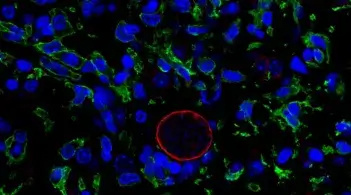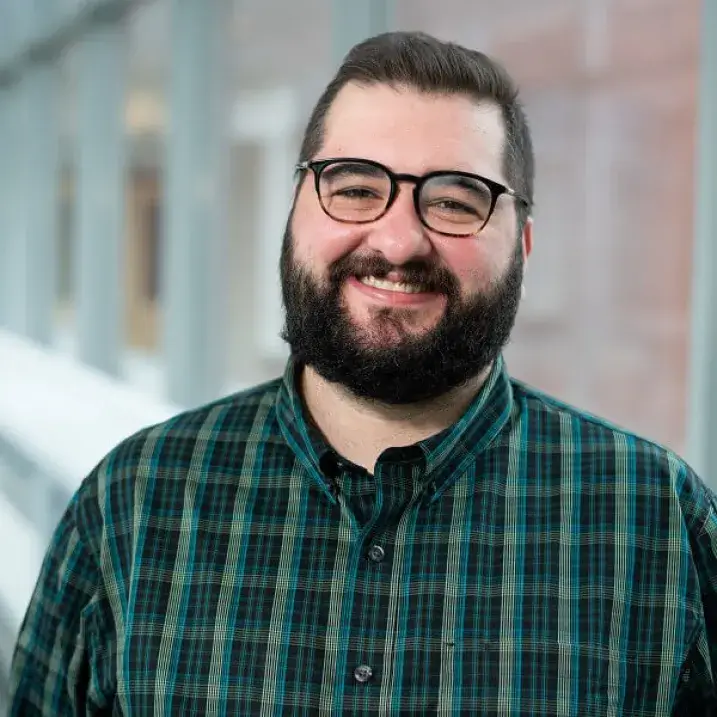bruno.mdigenova@med.uvm.edu
320 Stafford Hall
95 Carrigan Drive
Burlington, VT 05405
United States
Affiliated Department(s)
Dept of Microbiology and Molecular Genetics
Media Ready
print/web
print/web
JOURNALISTS: Need help scheduling an interview? Contact UVM media relations or search for a UVM expert.
Areas of expertise
Molecular and cellular biology, metabolism, parasitology, single-celled eukaryotes.
BIO
- Doctoral Studies: Received a Ph.D. in Brazil from the Paulista Medical School (EPM), Federal University of São Paulo (UNIFESP), where research focused on the cellular biology of Giardia lamblia.
- Postdoctoral Research: Investigated Toxoplasma gondii–host interactions at the University of Wisconsin–Madison with Dr. Knoll.
- Current Position: Joined the Department of Microbiology and Molecular Genetics in 2021, advancing research on eukaryotic pathogens.
Courses
- MMG 3300 Emerging Infectious Diseases
Publications
Awards and Achievements
- Research Interests
- Focus on Eukaryotic Pathogens: Investigate the biology of parasites and their interactions with the host, with an emphasis on brain immunology and the mechanisms underlying chronic infections.
- Key Organism—Toxoplasma gondii: Study a globally prevalent parasite that infects one-third of the human population, posing severe risks in immunocompromised patients. Despite its widespread impact, no treatment specifically targets its chronic stages, including those in the central nervous system.
- Metabolic Requirements & Environmental Triggers: Aim to identify the factors that drive establishment and persistence of chronic T. gondii infection, focusing on how the parasite adapts within host tissues.
- Methodological Approaches: Employ imaging, OMICS, and other advanced techniques to delineate both parasite biology and host responses, thereby clarifying new therapeutic targets.
- Long-Term Goals: Advance fundamental knowledge of parasite–host interactions and develop improved strategies for treatment and management of chronic parasitic infections.
Bio
- Doctoral Studies: Received a Ph.D. in Brazil from the Paulista Medical School (EPM), Federal University of São Paulo (UNIFESP), where research focused on the cellular biology of Giardia lamblia.
- Postdoctoral Research: Investigated Toxoplasma gondii–host interactions at the University of Wisconsin–Madison with Dr. Knoll.
- Current Position: Joined the Department of Microbiology and Molecular Genetics in 2021, advancing research on eukaryotic pathogens.
Courses
- MMG 3300 Emerging Infectious Diseases
Publications
Awards and Achievements
- Research Interests
- Focus on Eukaryotic Pathogens: Investigate the biology of parasites and their interactions with the host, with an emphasis on brain immunology and the mechanisms underlying chronic infections.
- Key Organism—Toxoplasma gondii: Study a globally prevalent parasite that infects one-third of the human population, posing severe risks in immunocompromised patients. Despite its widespread impact, no treatment specifically targets its chronic stages, including those in the central nervous system.
- Metabolic Requirements & Environmental Triggers: Aim to identify the factors that drive establishment and persistence of chronic T. gondii infection, focusing on how the parasite adapts within host tissues.
- Methodological Approaches: Employ imaging, OMICS, and other advanced techniques to delineate both parasite biology and host responses, thereby clarifying new therapeutic targets.
- Long-Term Goals: Advance fundamental knowledge of parasite–host interactions and develop improved strategies for treatment and management of chronic parasitic infections.

Sample: mouse brain chronically infected with T. gondii. (Red: T. gondii cyst; green: immune cells; blue: DAPI)
Lab Team
Euwen Brennan
Aditya Patwardhan
Meghan Quinlan
Aditya Patwardhan
Meghan Quinlan
